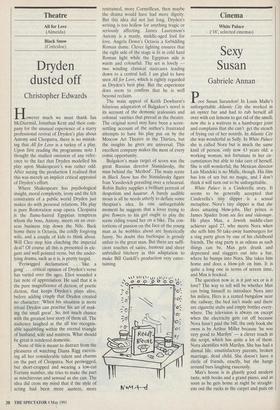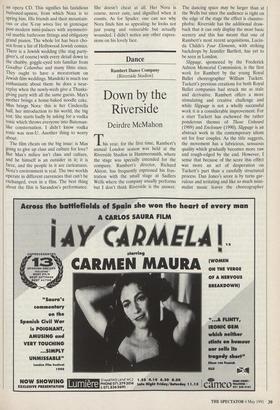Cinema
White Palace ('18', selected cinemas)
Sexy Susan
Gabriele Annan
Poor Susan Sarandon! In Louis Malle's unforgettable Atlantic City she worked in an oyster bar and had to rub herself all over with cut lemons to get rid of the smell; now she is a waitress in a hamburger joint and complains that she can't get the stench of frying out of her nostrils. In Atlantic City she was wonderful as Sally. In White Palace she is called Nora but is much the same kind of person, only now 43 years old: a working woman, not fortunate in her cir- cumstances but able to take care of herself. She is still wonderful; the Mexican director Luis Mandoki is no Malle, though. His film has lots of sex but no magic, and I don't think it will turn out to be unforgettable.
White Palace is a Cinderella story. It seems to be generally accepted that Cinderella's tiny slipper is a sexual metaphor. Nora's tiny slipper is that she does amazing blow-jobs. Her prince is James Spader from sex lies and videotape. He plays Max, a Jewish middle-class achiever aged 27, who meets Nora when she sells him 50 take-away hamburgers for a stag party given by one of his childhood friends. The stag party is as odious as such things can be. Max gets drunk and depressed and staggers out into a bar, where he bumps into Nora. She takes him home and does a blow-job on him. It is quite a long one in terms of screen time, and Max is hooked.
The question now is: is it just sex or is it love? The way to tell will be whether Max can bring himself to introduce Nora into his milieu. Hers is a rented bungalow near the railway; the bed isn't made and there are cigarette stubs and empty bottles every- where. The television is always on except when the electricity gets cut off because Nora hasn't paid the bill; the only book she owns is by Arthur Miller because `he was very good to Marilyn' — a clever touch in the script, which has quite a lot of them. Nora identifies with Marilyn. She has had a dismal life: unsatisfactory parents, broken marriage, dead child. She doesn't have a circle of friends, exactly, but she hangs around bars laughing raucously.
Max's house is in ghastly good modern taste, with books and a grand piano, and as soon as he gets home at night he straight- ens out the rucks in the carpet and puts on
an opera CD. This signifies his fastidious buttoned-upness, from which Nora is to Spring him. His friends and their mountain- ous or else X-ray wives live in grotesque Post-modern mini-palaces with asymmetri- cal marble bathroom fittings and obligatory grand pianos. The whole lot has been cho- sen from a list of Hollywood Jewish comics. There is a Jewish wedding (the stag party- giver's, of course) with every detail down to the chubby, goggle-eyed tots familiar from Goodbye Columbus and many films since. They ought to have a moratorium on Jewish film weddings. Mandoki is much too enthusiastic about them: he does a near- replay when the newly-weds give a Thanks- giving party with all the same guests. Max's mother brings a home-baked noodle cake. Max brings Nora: this is her Cinderella ball, her introduction to his world, the big test. She starts badly by asking for a vodka tonic which throws everyone into Bateman- like consternation. I didn't know vodka tonic was non-U. Another thing to worry about.
The film cheats on the big issue: is Max going to give up class and culture for love? But Max's milieu isn't class and culture, and he himself is an outsider in it; it is farce, and the people in it are caricatures. Nora's environment is real. The two worlds Operate in different currencies that can't be exchanged, even in a film. The best thing about the film is Sarandon's performance. She doesn't cheat at all. Her Nora is coarse, never cute, and dignified when it counts. As for Spader, one can see why Nora finds him so appealing: he looks not just young and vulnerable but actually wounded. I didn't notice any other expres- sions on his lovely face.



















































 Previous page
Previous page